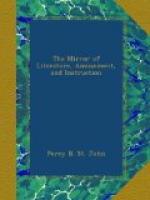[ 1] We believe, in Evans’s collection.
[ 2] It is only three miles
from Oxford, and six or seven from
Abingdon.
[ 3] His general mode of murder
was by poison; and it is said, that
he
so perished himself.
* * * * *
MEXICAN MINES.
It appears that, on an average of the fifteen years previous to the revolution, about twenty-two millions of dollars were exported, and that there was an accumulation of about two millions. Since the revolution, the exports have averaged 13,587,052 dollars, while the produce has decreased to eleven millions. This change was the natural consequence of the revolution. The favourable accounts of Humboldt excited a spirit of speculation that was wholly regardless of passing events; and the Act of Congress, facilitating the co-operation of foreigners with the natives, produced a mania which has been destructive to numberless individuals, who trusted too much to names. Seven English companies, with a capital of at least three millions, were established, and these were followed by two American, and one German, companies. Such was the rage for mining on the Royal Exchange, that for a time it was only necessary for any one to appear with contracts made with Mexican mine owners to establish a company. Many who were so ignorant as not even to know the difference between a shaft and a level, commenced speculators, not for the purpose of fairly earning a reward for doing some service to those to whom they offered their mines, but to fill their own purses without reference to consequences. Such a system of unprincipled conduct could not last; almost all the minor performers have been driven from the stage, and the respectable associations alone maintain their footing, though the want of returns for the immense sums invested has tended to produce a general want of confidence.
Since these enterprises have been undertaken, an immense and fruitless expenditure has been incurred by sending out machinery, which could be of no earthly use—by despising the native processes, and substituting others that have been found wholly inapplicable—and by introducing British labourers, who when abroad reverse all the good qualities for which they are valuable at home. A reform in this system we believe to have been generally adopted, and we are sure that a reduction of expense, a management purely European, and native labour, with only such modifications in working, smelting, or amalgamating, as experience will prove to be advantageous, will, in a moderate time, return the capital already expended, with a commensurate advantage. But these things can only take place provided the public tranquillity be maintained, and the government keep their engagements with foreigners inviolate. The insecurity arising from the domestic feuds now disturbing this fine country, must, if it continues, finally annihilate its best resources.—Foreign Quarterly Review.




